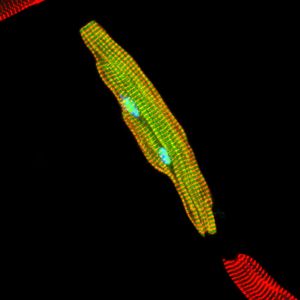Six months after the 55 participants in the CAREMI clinical trial received treatment with AlloCSC-01 –a new therapy based on cardiac stem cells isolated from donor hearts— the first results have been released.
According to Dr. Antonio Bernad, coordinator of this European project and scientist at the Centro Nacional de Biotecnología of the CSIC (CNB-CSIC), "CAREMI is the first clinical trial in humans to evaluate the efficacy of treatment with AlloCSC-01 cells for extensive myocardial infarction. Initial results indicate that the treatment is safe for patients, but until next year we will not have the final results for efficacy and safety." Eight centres participate in the clinical trial, led by Prof. Francisco Fernández-Avilés of the Gregorio Marañón University Hospital (Madrid), and Prof. Stefan Janssens of the University Hospital of Leuven (Belgium).
Acute myocardial infarction is one of the great health challenges worldwide. Although rapid intervention and effective current treatments have reduced the mortality rate, it is still responsible for most cases of underlying chronic cardiac insufficiency.
"Current therapies are incapable of regeneration,” Bernad explains. “We need a new treatment that promotes the recovery of lost tissue and reduces pathological remodelling of the heart." AlloCSC-01 is based on allogeneic cardiac stem cells (derived from a donor patient) that are administered simply and safely by intracoronary route. The researchers hope that this cell therapy will be effective in controlling heart disease in patients who have suffered an extensive infarction.
The trial is part of the European CARE-MI project (Cardio Repair European Multidisciplinary Initiative), whose main objective is to advance the development of cell therapies for myocardial infarction. This project is funded by the European Union Seventh Framework Programme and is coordinated by the National Centre for Cardiovascular Research (CNIC).
The project team worked for six years to develop this therapy based on reinforcing the natural regenerative capacity of the heart. The resulting cell product, AlloCSC-01, was generated by the company Coretherapix/Tigenix. The first results of the phase I/II clinical trial now indicate that the treatment is safe in the acute phase (one month after injection) and the long term (six months after treatment). The efficacy data are not yet conclusive, and will be announced in 2017.
The European CARE-MI consortium
The CARE-MI Project, funded with €11.3 M by the European Commission Seventh Framework Programme, brings together specialists in basic and applied research, clinical centres and pharmaceutical companies, coordinated by the National Centre for Cardiovascular Research (CNIC). The objective is to advance development of several possibilities for cardiac regeneration therapies. Under the technological leadership of Coretherapix/Tigenix, a new therapeutic product was generated with cardiac stem cells (AlloCSC-01).
The Centre for Minimally Invasive Surgery Jesús Usón (Spain) and KU Leuven (Belgium) developed the animal models necessary for preclinical validation. The companies Vivotecnica and Farma-Cros (Spain) generated biosafety and biodistribution data in the early stages of preclinical development. Sponsored by Coretherapix/Tigenix, 3P Biopharmaceuticals (Spain) was subcontracted to manufacture AlloCSC-01. KU Leuven (Belgium) and the University General Hospital Gregorio Marañón (Spain) lead the clinical trial. The HLA-Med group at the Hospital St. Louis (France) characterized the interaction of the allogeneic cell product with the immune system. In parallel, the CNB-CSIC (Spain), the CNIC (Spain) and the Institute of Experimental Biology and Technology (IBET, Portugal) carried out molecular and cellular characterization of the product, studying its response to various stimuli and experimenting with new technologies for future scaling-up of the manufacturing process. Philips Ibérica (Spain) also contributed new approaches for monitoring cardiac function with magnetic resonance imaging. The following institutions contributed to the research: CNB-CSIC (Spain), King's College London (UK), IBET (Portugal), CNIC (Spain), University of Goettingen (Germany), University of Ljubljana (Slovenia), KU Leuven (Belgium), Liverpool John Moores University (UK) and the Hospital Vall d'Hebron (Spain). The Dutch companies Innocore and Nanomi (recently acquired by Lupin) simultaneously explored the use of growth factors such as alternative non-cellular alternative/complementary therapy in the treatment of myocardial infarction.






